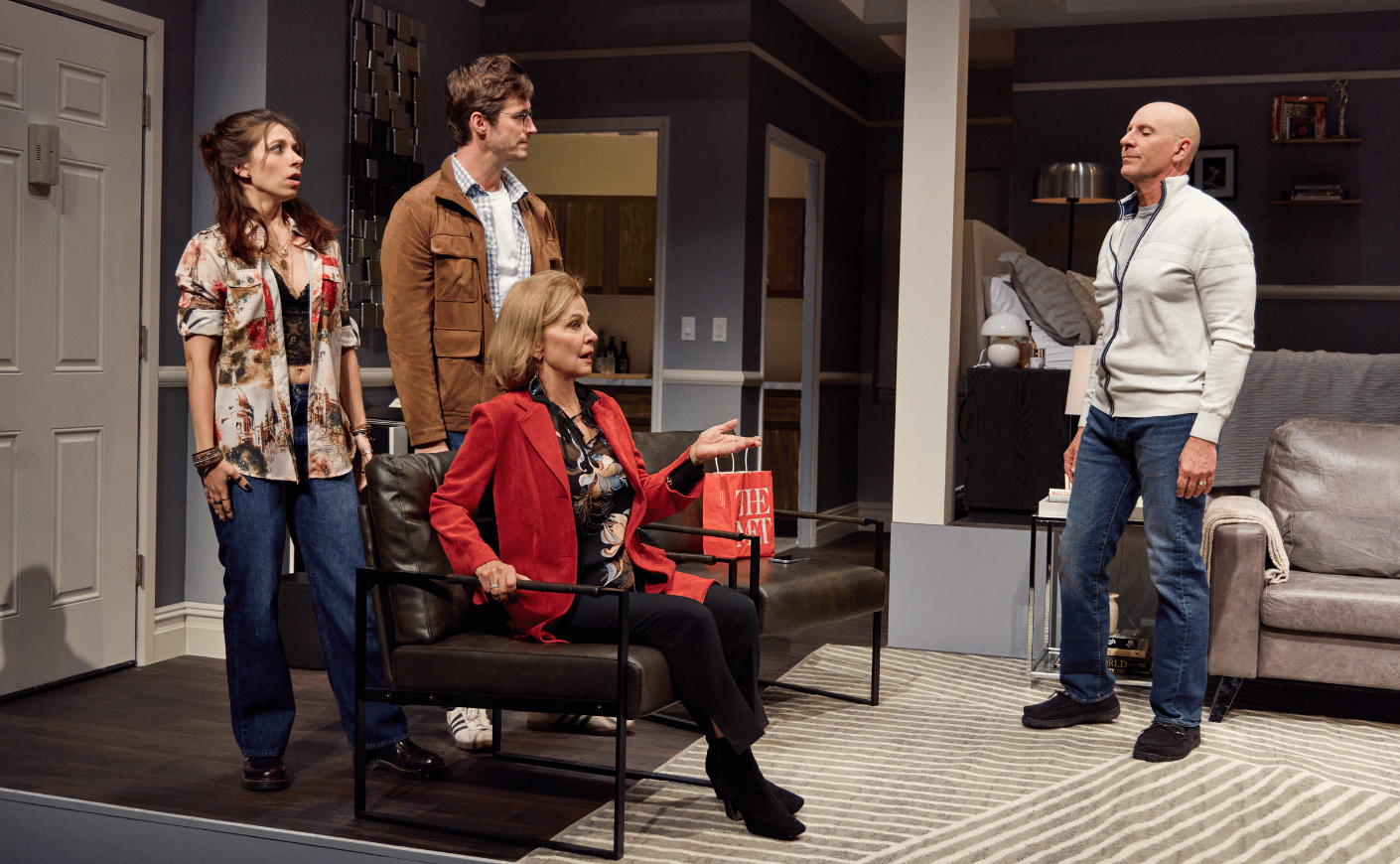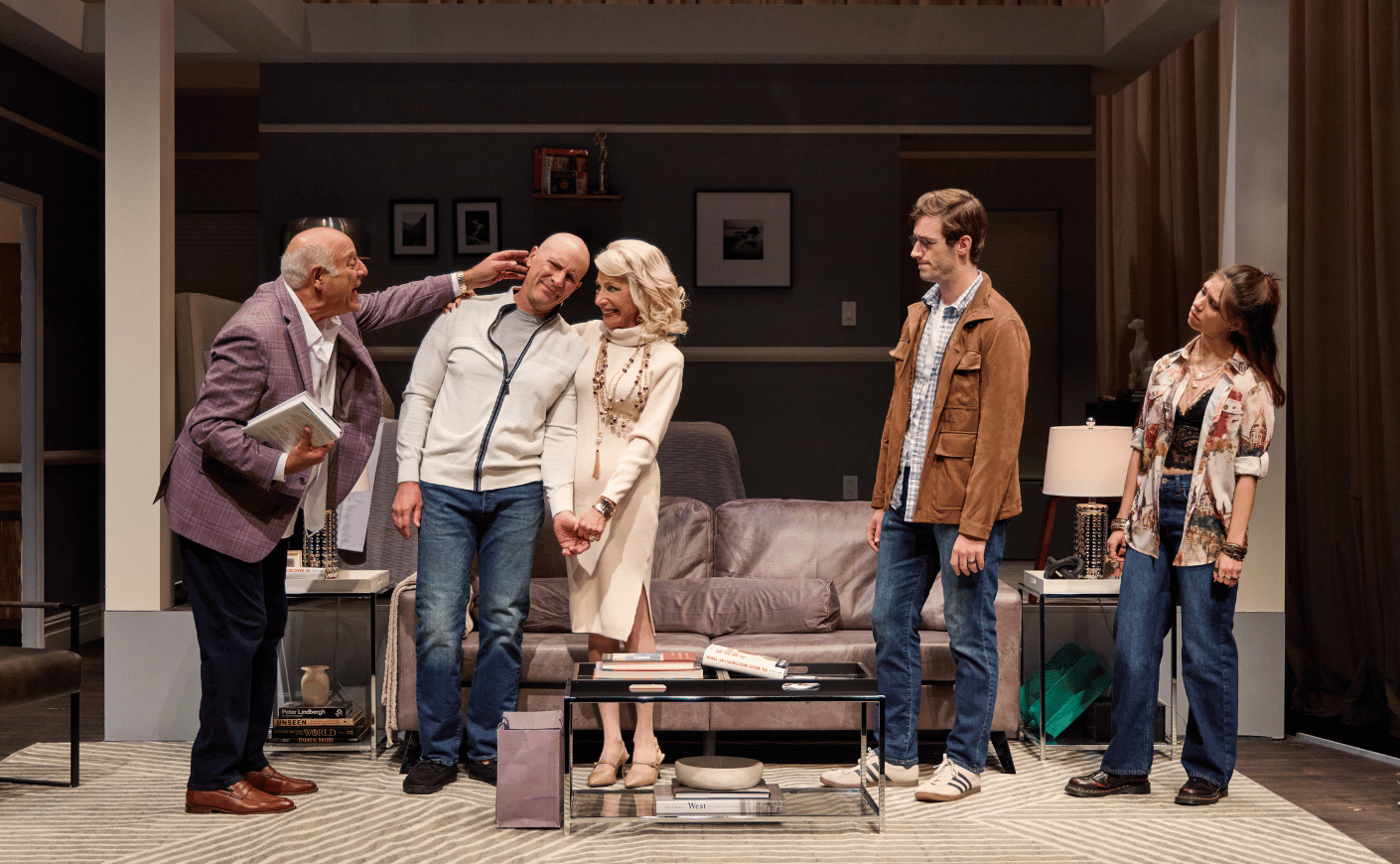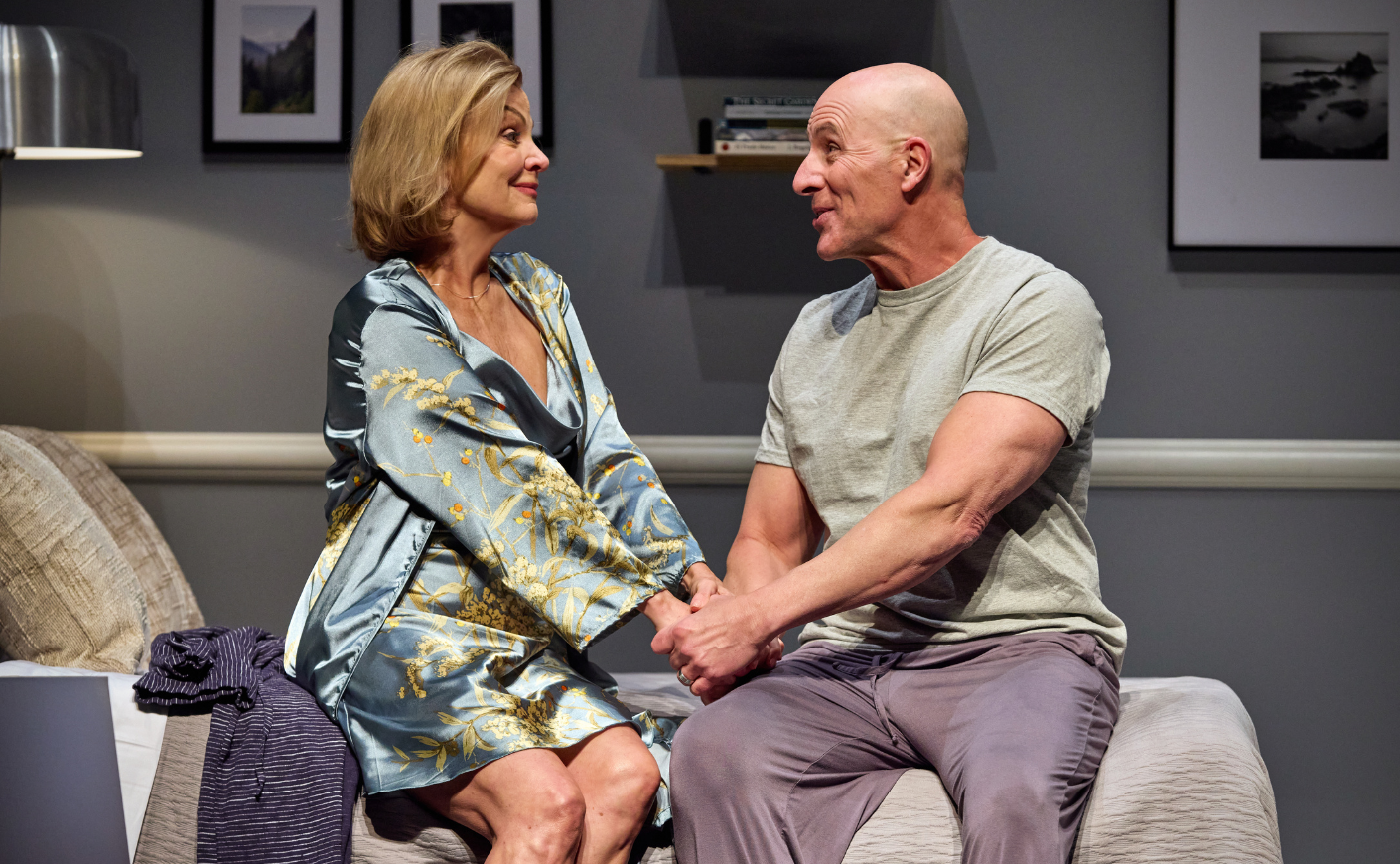Anyone who's ever been married knows very well how complicated things can get between two people — and every fascinating shade of that dynamic is beautifully brought to life in "Art of Leaving," an eye-opening comedy currently playing Off-Broadway in New York City.
The show follows three couples, each working through their own personal relationship issues and trying to navigate what their future might look like. The exploration of how people of different genders and different generations think about their love lives is fascinating and deeply relatable, and the play not only raises important questions but also offers emotional catharsis you'll be thinking about long after you leave the theater.
Our very own Katie Couric and John Molner recently saw the show, and they're big fans. After meeting the cast backstage, Katie reconnected with actress Audrey Heffernan Meyer to dig a little deeper about how the production came together. Below, Meyer sheds light on her character, Diana, who's struggling to connect with a husband dealing with his midlife crisis through the advice of a dubious doctor, along with the meaningful reactions from audiences, the process of mounting a production in NYC, and so much more.
And after you're done reading, you can grab your tickets right here — which we highly recommend.
Katie Couric: Audrey, what appealed to you about this play?
Audrey Heffernan Meyer: I was so drawn to this exploration of marriage, non-traditional relationships, and the nuances and challenges inherent in each. We see three couples in a loving yet dysfunctional family with strikingly different views on how to make their relationships work (or not). Whose marriage will be saved? What are the gender expectations of each partner? Is polyamory an option? Should one leave or tough it out if they’re suffering mental abuse? Can couples survive when one wants something totally foreign to the other? What does it take to keep a very long love affair alive when faced with enormous challenges?
Audiences are going home to talk further about what they've just seen. It’s enormously gratifying to hear the reactions we get at every performance. As an actor, there's nothing like it. Women stop me at the stage door with tears in their eyes, saying how they were verbally mistreated by their partners for years and didn’t have the courage to leave. Husbands admit they'd better start thinking more about what they say to (or expect from) their wives. We all know people who must wrestle with these big questions and tough choices in life. I witnessed this in my own upbringing as my parents finally divorced after 33 years of marriage — and saw the sacrifices my mother had to make when she left.
But the true brilliance of this play is the comedic style, which somehow keeps the audiences laughing, guffawing, gasping, and cheering at the surprise twist at the end. It keeps the audience guessing. Who and what will prevail: the manosphere or female empowerment? Who will stay, and who will leave? There truly is not another comedic Off-Broadway play with the depth and discourse of Art of Leaving, playing onstage right now at such a fine theater as the Alice Griffin Jewel Box.

Can you tell me about the playwright and when it was written?
Anne Marilyn Lucas wrote this play based on her own experiences and the issues she faced in her very long marriage. One day, her husband told her he was no longer happy with her or their relationship. She was devastated, and yet she decided to put her anger, sorrow, and frustration into a play. She wrote this as a catharsis of sorts, and the criticisms and demeaning words she endured are mostly verbatim in the script.
She began writing it as a 10-minute exploration of ideas in 2013. Anne has said she wants audiences to laugh at the comedy and the situation that unfolds every night on stage, but she also hopes that some good will come out of the play being seen by a wider audience in New York: That maybe one unhappy wife — or husband — might be brave enough to escape their hurtful relationship.
There is a reason why people have referred to this piece as Neil Simon meets A Doll’s House. No marriage is as important as one’s own personal happiness. All too often, we’ve all been taught to "grin and bear it," and the play makes us see that there are indeed options for a better life. My character, Diana, gets to have the final word (and the last laugh), but Anne did not. It took Anne some time to find that humor, and she is brave to share it with all of us. Through every version of her play (I’ve watched it grow since I played Diana in a reading during the pandemic in 2020), the elements at its core have always remained: tremendous humor, humanity, and hope.
Your character's husband, Aaron, who's played by Jordan Lage, is being brainwashed by the author/therapist with whom he is obsessed. Do you have any sympathy for him as a character?
Oh, I do! Jordan is such a terrific actor; he just finished a turn in Glengarry Glen Ross on Broadway. In Art of Leaving, you witness the obvious sexual attraction that Aaron and Diana share in the first scene, then come to learn that this goes against his grand scheme of wanting a divorce! Aaron is depressed about facing middle age, and unfortunately, he turns to the unscrupulous self-help author Dr. Stang, who seems to give him the answers he's seeking. Of course, we see the flaws in that right away, but Aaron is blind to this. He’s been already brainwashed.
I think we can all relate to seeing friends and family rely on a certain book, podcast, potion, or guru telling them if they do this one thing, all their problems will be solved. Audiences see that Dr. Stang’s advice is ludicrous, but Aaron is already convinced that this one book holds the answers to his happiness. In truth, he's been ignoring the unconditional love and support from his wife, Diana, for years. He’s taken her for granted and convinced her that she’s to blame for his midlife crisis. Playing those scenes with Jordan every night is so thrilling.
I thought it was interesting that the play chronicles three different generations and how they view a relationship. Can you tell us more about that?
Jordan and I play the central characters, whose marriage really kicks the show into high gear. We also meet Aaron’s parents, a traditional Jewish couple from Long Island who are married for 59 years. They have faced their own issues, and their secrets are revealed through the play. The young couple, Diana and Aaron’s engaged son, Jason, and his “open-minded” fiancée Caitlyn, differ on their views of the requirements for sharing a long-term relationship. Monogamy or polyamory, that is the question — which, for them, has its own set of challenges.
The play delves into these themes of polyamory and infidelity, of finding what makes one happy and what doesn’t. It’s not about "settling," marrying for convenience, or simply security, but it may just be about compromise. It’s so lovely to see all generations in the audience identifying with these characters.

What are some of the challenges of producing a play in New York, where there’s so much competition and so many people want to stay home for “Netflix and chill”? How have you been able to encourage people to see the play?
Producing a play in New York has unique challenges, and my castmate Alan Ceppos and I put together a great team of theater management professionals, co-producers, and investors to guide us through. We toured theaters to find an Off-Broadway-size house, with 199 seats or less, and we performed readings and hosted talkbacks with audiences for the playwright and dramaturg to get feedback for rewrites. All of this is challenging, and it took over a year. Between the cast, understudies, directors, stage managers, designers, and accountants, we’re a team of close to 50. You become like family during months of rehearsals, previews, and a 10-week run of show.
Most importantly, the team’s goal is to ensure the play will stand out in a crowded field. People are craving the six-character comedy, the kitchen-sink dramas, the 90-minute play that packs a punch. And this one does!
Audiences want community. They want to get out, see friends, have a meal, and have a shared experience. Everyone enjoys a good night in front of the TV, but nothing beats the thrill, the electricity, the visceral reactions, and the humanity that one can experience in live theater.









